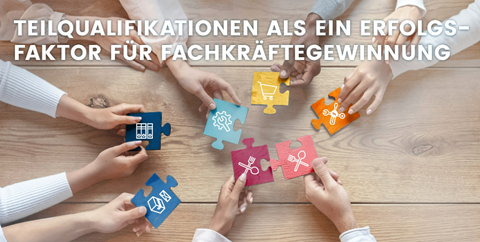Developing skills for EU Competitiveness: partial qualifications in Germany – Skills interview series
Throughout the European Year of Skills, Eurochambres News will publish a series of short interviews to showcase the chamber network’s efforts to contribute to the large-scale upskilling and reskilling efforts. Kicking off this series, Antje Baier, project leader at German Chamber of Commerce and Industry (DIHK) presents the initiative: “Chancen Nutzen! Mit Teilqualifikationen Richtung Berufsabschluss“, focusing on partial qualifications. Partial qualifications are used in continuous education and training as a way to certify a learning outcome that does not lead to a full qualification. They provide flexible learning paths to better manage work transitions and are as such a valuable element in upskilling and reskilling.
- 2023 is now officially the European Year of Skills. What are your expectations for this year?
In a fast-changing world, and with growing skills shortages in Europe, flexible skills are essential. We therefore welcome this emphasis on skills development. And we hope that this year will help raise awareness, encourage the sharing of best practices and help improve the transparency and recognition of qualifications across Europe.
- Can you tell us a few words about the “Chancen nutzen“ project, and how it can bridge a gap in terms of skills development?
The Project: “Chancen Nutzen! Mit Teilqualifikationen Richtung Berufsabschluss” is funded by the Federal Ministry of Education and Research and aims to help creatine standards for partial qualifications. It coordinates the actions of the 79 chambers of industry and commerce (IHKs) in that field and helps promoting partial qualification for people of 25 years and above.
Partial qualifications are a possibility to learn vocational knowledge and acquire skills step-by-step for people of the age of 25 years and above. In the end, a participant has the possibility to obtain a professional qualification. After single learning units (Teilqualifikationen), there is a verification of the skills’ level, called verification of competence (Kompetenzfeststellung). These tests of competence are offered by the 79 chambers (IHKs). Once they pass this test, the participants receive a certificate (IHK-Zertifikat) issued by the regional chamber. Single qualifications can be combined. If one has acquired all the skills and competences required for a certain occupation, it is possible to participate in the final test for this occupation and then fully graduate.
This project has a positive effect on upskilling the workforce while helping companies to develop their talents. To give you one example: Continental Enterprise, a supplier of automotive industry has started using partial qualifications for and has qualified over 1000 people since 2019.
- How do you see the contribution of the chamber network to the upskilling and reskilling effort needed across the EU?
The expertise of Chambers is key to ensure the quality of these processes. In Germany, they are responsible for the vocational examination and also offer standardised testing after partial qualifications. These standards are not only important for quality-assurance but also for transparency and portability of qualifications.
More information about the Chancen Nutzen! Mit Teilqualifikationen Richtung Berufsabschluss project can be found here: https://teilqualifikation.dihk.de/de
